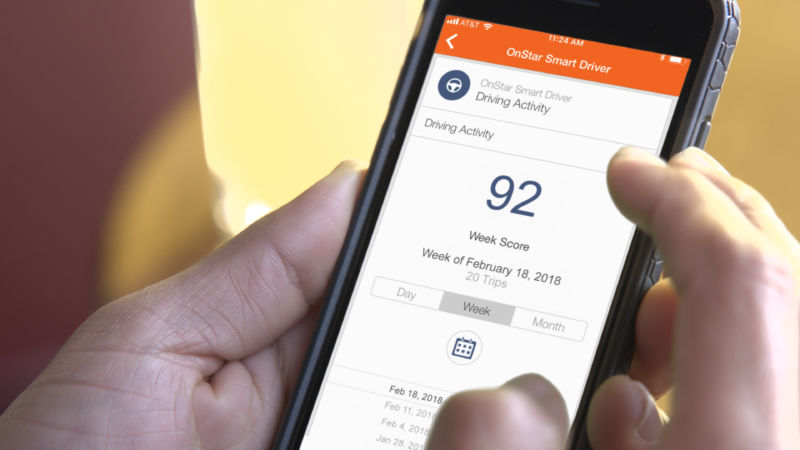
Everyone thinks they're a good driver. Despite this, the annual death toll on our roads keeps going up—despite ever-safer vehicles—and human error is to blame for 97 percent of all fatal crashes. Bad driving isn't just about crashes, though; racing from stoplight to stoplight is bad for the planet, since it adds unnecessary carbon to our atmosphere at a time when we can ill afford it. In the age of the connected car, it has become trivial to quantify just how good or bad a driver one is; for some time now, some insurance companies have been supplying customers with plug-in devices that can track their driving and—assuming it's good—offer a discount as a result. But you don't even need one of those dongles to do that, as some new cars can do that tracking on their own.
A while back, we tested out a Buick Enclave that comes with a feature called Teen Driver that lets parents monitor their offspring remotely behind the wheel. And, as it turns out, there's an adult version, too—it's called Smart Driver.Smart Driver leverages General Motors' OnStar platform. Sensors on the car record events like hard braking, hard acceleration, high-speed driving, late-night driving, and fuel economy, uploading that data to OnStar's cloud where it can be accessed via the myBuick app.
"In today’s world, people are using health, finance, and even sleep monitoring apps to help improve their lifestyle and well-being," said Steve Samolinski, senior manager of Buick Connected Services. "Bringing Buick Smart Driver services into the myBuick app can help our customers become more aware of their driving behaviors and improve as necessary."
For some time now, I've noticed that my colleague Eric Bangeman—who has been pitching in with some car reviews—manages to get far closer to a vehicle's EPA gas mileage rating than I can. Rather than just accept the fact that Eric is a driving god and I am a driving chump, we each borrowed a Buick Regal set up with the Smart Driver system and drove the cars for a week to get some actual data.Eric is consistently a pillar of virtue
-
Smart Driver is accessed via the myBuick app.
-
-
After monitoring your driving for 90 days, it can use that data to prove you're a good driver. Like Eric.
-
But that's not mandatory, you could just use it as an automotive FitBit.
-
Yeah, yeah, rub it in Mr Driving God.
-
-
-
Even his low score was damn good.
-
Individual trips.
-
Eric never mashed the throttle.
-
His average over the week was 95.
-
The myBuick app lets you remotely start or stop your engine, lock or unlock your car, or sound the horn and light the lights.
-
You can also search for locations and send them to your car's navigation system.
-
It lets you check your tire pressures.
As befits a wise managing editor and parent of two, Eric is a model citizen behind the wheel [Editor's note: if I'm not testing a Maserati Levante or Alfa Romeo Stelvio Quadrifoglio...]. Over the course of the week, his score for individual drives did not drop below 89—out of a maximum 100 points. Over a distance of 238 miles (383km), Smart Driver rated him at 95. During that time, his fuel economy was measured at 26mpg—soundly beating the EPA combined figure of 24mpg. Most impressively, he didn't record a single hard braking or hard acceleration event. He is, it seems, the very model of serenity behind the wheel as he drives around suburban Chicago.
I can drive well, but often I don’t
-
Oh dear.
-
I can drive well, and the data proves it.
-
Look, Eric, I too can get a perfect score on some trips!
-
Oh. That's not so good.
-
Can I blame this on DC traffic?
-
Jonny Leadfoot.
-
My scores went up and down like a rollercoaster.
On the other hand, I was a much more mixed bag. The good news? I am able to drive like Eric. On at least one trip I, too, scored a perfect 100, my best daily score was 96, and I also managed an 82 during that week. The bad news? I don't drive like Eric, at least not most of the time. Over the same time period that the boss scored his 96, I was rated a pathetic 56 points over 80 miles, at just 23mpg. My personal low point occurred on a Monday; over the course of six miles, I racked up two hard braking events, 15 (!) hard acceleration events, and 11mpg to achieve just 10 points out of 100. (For reference, the EPA rates the Buick at 21mpg for city driving.)
In my defense, if you had to run out to pick up lunch and complete a couple of other errands in downtown Washington DC, you might get frustrated and mash the loud pedal once or twice, too... Seriously, though, that's not a good excuse, and I was a little chastened once I saw the data. And I'm glad that my insurance rates weren't at risk, although knowing there were no real stakes other than the public shame of having to admit all of this to you, dear reader, meant I didn't exercise as much restraint while driving as perhaps I should have. I like to think I've been doing a lot better since this little experiment, but in the absence of supporting evidence, you'll just have to take my word for it.
reader comments
190